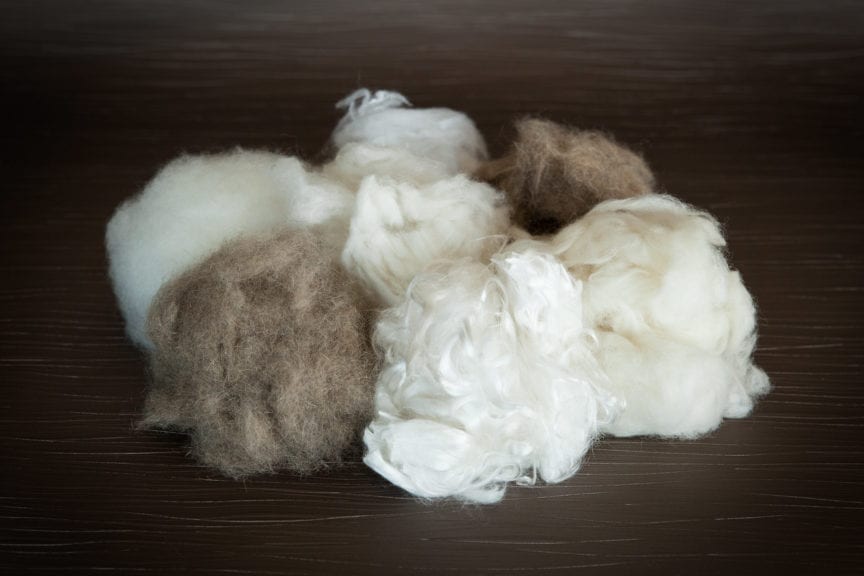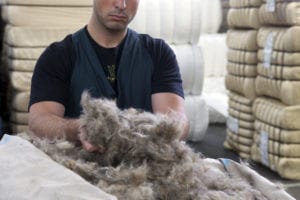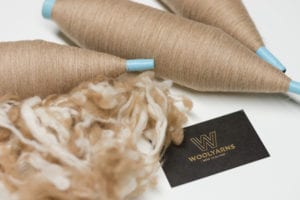The importance of sustainability in the fashion and textile industry is a well-known issue. The textile industry is a major contributor to climate and social issues globally, and there is constant and growing pressure from consumers for businesses to produce more sustainable products. For many businesses, success lies in having robust and transparent supply chains and sustainable practices in place. At Woolyarns, we are committed to making the production of yarns as sustainable as possible. We work hard to be transparent about our supply chains, production practices, and workers’ wellbeing. We use the United Nations 17 Sustainable Development Goals as a baseline measure of our business’s sustainability progress and success.
The United Nations introduced the 17 Sustainable Development Goals (SDGs) in 2015 in response to the climate crisis and social inequality worldwide. The SDGs are a set of goals aimed at minimising human’s negative impacts on the environment and tackling social issues such as poverty and inequality by 2030. The SDGs give nations, communities, and businesses like ours a set of shared goals to work towards and to hold each other accountable for.
New Zealand is committed to the Sustainable Development Goals
The New Zealand Government committed to the SDGs in 2015 and posted a voluntary national review showing New Zealand’s position on each goal (New Zealand Voluntary National Review, 2019). The report outlines what practices are in place to ensure the country is successful in meeting the goals by 2030. New Zealand is fortunate to have a legal framework in place that regulates working conditions, access to education, access to clean water and affordable energy, fair treatment of animals, and protection of our oceans, waterways, land, and forests.
Below we have outlined some SDG-focused initiatives underway in New Zealand, reflecting the countries commitment to meeting the goals. We have focused on the goals that affect Woolyarns and our practices most. You can see the full list of Sustainable Development Goals and the targets for each goal on the United Nations website.
Goal 6: Clean Water and Sanitation: New Zealand already meets or exceeds targets under goal six, but work is underway to ensure freshwater in New Zealand is managed and used as efficiently as possible. The Resource Management Act (1991), the Health Act, and the upcoming Essential Freshwater Package ensure water catchment and unsustainable water usage in the agricultural industry is minimized and appropriately managed.
Goal 7: Affordable and Clean Energy: New Zealand’s energy is 85% renewable and is predominantly from hydropower, wind, and geothermal sources. New Zealanders have access to reliable modern energy throughout the country and an Electricity Price Review is underway to combat rising electricity prices. The governments’ goal is for energy to be 100% renewable by 2035. Policymakers and the Interim Climate Change Committee are investigating possible methods to achieve this goal.
In 2016, the New Zealand government signed the Paris Agreement which will see the country carbon emission-free by 2050 and strengthens contributions to goal seven.
Goal 8: Decent Work and Economic Growth: The Employment Relations Act 2000 is an employment law that ensures fair and legal treatment of employees and includes fair pay, holiday pay and sick leave, and working hours and working conditions for all New Zealand businesses and employees. Unemployment rates in New Zealand are low post Covid-19 lockdown, however there are still issues surrounding gender and ethnicity employment rates and pay gaps. The Gender Pay Taskforce is a partnership between the Ministry for Woman and the Public Service Commission that supports agencies to deliver The Gender Pay Gap Action Plan. The Equal Pay Amendment Bill was introduced in 2020 to ensure New Zealand businesses and government close the gender pay gap, with an emphasis on historically undervalued female-dominated jobs.
Goal 9: Industry, Innovation and Infrastructure: The government aims to support business innovation and to invest in infrastructure that will generate sustainable growth for the economy, industries and communities. Legislation is in place to reduce the negative impacts of farming, to reduce use of single-use plastic, and to increase clean energy usage in industries. Progress is needed in workforce growth and training, and the use and procurement of sustainable materials for all organizations.
Goal 12: Sustainable Consumption and Production: New Zealand’s framework for responsible growth, procurement and use of raw materials is managed through the Resource Management Act (1991) and the Animal Welfare Act (1999). This ensures the care and protection of humans, animals and the environment from the production of raw materials to the end of life.
New Zealand aims to create a circular economy by changing how resources are managed, waste and greenhouse gasses are reduced, and the environment is cared for. Coordination between central and local governments, and businesses and the public is required to see New Zealand transition to a circular economy.
New Zealand aims to be zero waste by 2025. The New Zealand Plastic Packaging Declaration was launched in 2018 and businesses committed to all packaging being 100% reusable, recyclable and compostable by 2025.
Goal 14: Life Below Water: New Zealand is strongly aligned with the targets for SDG 14. New Zealand’s focus is ensuring the health and fertility of oceans and the animals that inhabit them. Many targets for goal 14 are covered by the Resource Management Act (1991) and the Fisheries Act 1996. New Zealand’s marine and coastal ecosystems are managed by strict legislation and there are laws in place to reduce ocean pollution and to promote healthy waterways. Single-use plastic bags and microplastics from cosmetics are banned in New Zealand to reduce ocean pollution, improving ocean quality and life. Good land management practices are in place in agricultural industries for healthy waterways, and to eliminate pollution and debris.
Goal 15: Life on Land: The Department of Conservation (DOC) works to protect New Zealand’s forests, biodiversity and indigenous flora and fauna. Introduced pests, such as the Brushtail possum, cause immense harm to New Zealand’s native plants and species that historically had no natural predators, so conservation programs are essential. The DOC Predator Free 2050 initiative and the NZ Biodiversity Plan are in place to ensure the prosperity of life on land in New Zealand and protect flora and fauna from predators. Ethical and professional trapping of pests is regulated by the Animal Welfare Act 1999 and the New Zealand Fur Council’s Code of Practice which adheres to International Humane Trapping Standards.
Woolyarns is supporting New Zealand’s commitment to the Sustainable Development Goals
At Woolyarns, we pride ourselves on our efforts to care for our workers and the environment. We strive to exceed New Zealand government set regulations and we understand the importance of sustainable manufacturing, especially in the textile industry. We are committed to doing our part to ensure New Zealand meets the SDGs.
Animals, fibres, and the environment:
We understand that the quality of our yarns is dictated by the quality of the raw materials we source. We maintain strong working relationships with suppliers, many of whom are from New Zealand, and consider UN SDG 8: Decent work and economic growth, SDG 9: Industry, innovation and infrastructure, SDG 12: Responsible consumption and production, and SDG 15: Life on land when sourcing raw materials. The fibres used in the Perino yarn range are Brushtail possum down, ZQ merino, cashmere, mulberry silk and Lenzing lyocell.
The Brushtail Possum is an introduced pest that causes immense damage to New Zealand’s natural flora and fauna. Brushtail possums are professionally and ethically trapped following the Animal Welfare Act 1999, and trapping guides published by DOC. Possum eradication is a major focus for DOC’s Predator Free 2050 initiative and here at Woolyarns we utilize the byproduct of these conservation efforts by featuring Brushtail possum down fibre in the luxury yarn range – Perino. The fine micron and hollow core of Brushtail possum down fibre creates long-lasting fabrics that are low pilling, soft and incredibly warm. We use Brushtail possum down fibres exclusively harvested from specific regions in New Zealand at certain times of the year to ensure Perino yarns are of the highest quality.
Certified ZQ merino features heavily in our Perino range. ZQ is an internationally recognised certification that represents a high standard of animal welfare, environmental protection, social sustainability, and is famous for being fully traceable. The ZQ certification ensures the supply chain is meeting the SDGs, providing sustainable fibre for Woolyarns. We use ZQ merino wool in our luxury Perino yarns because of the sustainable production of the raw material, the traceability of the supply chain, and the superior softness and comfort it provides. This is thanks to the low micron and moisture management properties of these luxurious natural fibres.
Our dedicated sourcing team has built long-lasting relationships with our cashmere suppliers, sourcing the luxurious fibre from Mongolia, China, Australia, and New Zealand. Due to the nomadic lifestyle of cashmere farmers and goats in China and Mongolia, fibre certifications are hard to come by. We are moving toward a supply of New Zealand and Australian cashmere that is fully traceable and sustainable. Cashmere fibres sourced for Woolyarns are harvested by hand during the shedding season, helping the animals to stay cool and healthy during the hotter months. Cashmere fibres offer superior warmth and softness to Perino yarn.
We use Oeko-Tex (Standard 100) certified Mulberry silk that is produced without the use of harmful chemicals or substances. Mulberry silk fibre has a fine micron which improves the quality, strength and performance of the yarn. This is due to the greater number of fibres in the cross-section of the yarn. Mulberry silk adds a luxurious handle to Perino fabrics and is long-lasting and biodegradable.
Lenzing Lyocell is a cellulose fibre that is produced in Austria using wood pulp from sustainable forestry in a closed-loop process. More than 99% of the chemicals used in the production of the fibres are recovered and reused. Lyocell is a breathable and durable fibre, giving fabrics a smooth handle. It is also biodegradable – feeding back into the soil and closing the loop in the manufacturing process.
Woolyarns yarn production and the impact on the environment:
In addition to our responsible sourcing of fibres, we work hard to source dyestuff and chemicals through suppliers who share our values. No harmful chemicals are used in the production of our yarns, ensuring the safety of our people and the planet. These are in accordance with the European REACH regulations and aligns us with UN SDG 6: Clean Water and Sanitation, Goal 9: Industry, innovation and infrastructure, SDG 12: Responsible consumption and production, and Goal 14: Life below water.
The dyeing process is typically one of the most environmentally damaging aspects of textile production. Our onsite dyehouse uses reactive dyes, a cleaner option for fibre dyeing. We use specialty dyes that do not strip the fibres, resulting in better yarns and fabrics. Dye is absorbed by the fibre in the dying process, leaving the wastewater clear and recyclable. The trade wastewater from our onsite dyehouse is regularly tested and meets the local governments ‘low risk’ mark.
We measure our water and electricity usage and are aiming to minimise our consumption to reduce indirect greenhouse gas emissions.
Woolyarns are predominantly custom yarn spinners, so the yarns we produce are made to order, apart from a small amount of stock held for customer sampling purposes. Our yarns are custom made to suit our customers unique specifications and are used to make long-lasting, fit-for-purpose products. Any redundant stock yarns or cancelled orders are sold on our dedicated online site or in our factory shop.
We have a fully integrated fibre waste initiative that feeds waste fibres from the manufacturing process into dedicated waste yarn blends. The yarns from this program are used for workwear and socks, maximizing our raw materials and minimizing waste.
We recycle all cardboard and paper from our factory, and our yarns are wound onto cardboard cones that can be reused and recycled.
Strict production systems are in place within the factory to prevent mistakes, catching and rectifying them as early in the production process as possible. The yarn colour is checked three times during manufacturing and yarn skein/count is checked regularly throughout the carding process. These checks ensure our yarns are made to the high standards and specifications our customers expect. Our quality management system is based on Deming’s Principles. These ensure we are continually looking for ways to improve the quality of our products and reduce waste while creating a positive and collaborative work environment for our staff.
We are constantly reinvesting in our factory facilities to ensure our machinery is up to spec and is operating as efficiently as possible. This allows us to create high-quality, technical yarns without wasting materials or time.
Our people:
Woolyarns are proud to have dedicated employees that create the luxurious and technical yarns we are known for. SDG 8: Decent work and economic growth are at the forefront of our processes. We understand and value the vital part Woolyarns employees play in the success of the business. The working conditions and workplace culture are why we retain staff for as long as we do – for 10, 20 and even 40 years. The retention of staff and their skill is also how we are able to produce quality yarns year after year.
Our staff is culturally diverse, and we have good gender representation across the board due to our blind hiring system. Our internal recruitment process (when positions in our business become available) allows our staff to upskill and experience other sectors of the yarn manufacturing process, keeping them engaged and fulfilled in the work they do.
The health and safety of our staff are of the utmost importance. The Health and Safety Committee meets regularly to identify any hazards and rectify these through a well-managed plan. Free flu vaccinations are offered annually, along with regular hearing tests. Woolyarns also provide an independent contractor who meets with employees fortnightly for wellbeing check-ins. This provides an opportunity for the staff to provide feedback, voice concerns, or discuss issues they are having at work or in their personal life freely and in confidence.
Other initiatives underway:
Woolyarns are involved in a sustainability initiative, preventing textile waste in landfills, turning old New Zealand Police uniform into new products. Old wool Police jerseys are processed by Woolyarns and ragged into a workable fibre form which is spun into new yarn. A New Zealand weaving company weaves the yarn into a blanket for use in police cars. You can read the full story here.
Woolyarns support community initiatives such as the local Sportsville complex at Fraser park, and through contributions to local university student projects and education.
End of life
The textile industry is infamous for its high pollution, contribution to landfills, and the mistreatment of people. These are all impacted by poor manufacturing practices, unsustainable materials, fast fashion business models, and exploitation of human labour. Woolyarns are proud to produce yarn with a strong focus on sustainable sourcing of materials and production, ensuring the wellbeing of our staff and members of our supply chain.
Fabrics made from Perino are warm, soft, and durable. Perino fabrics last for 10-20 years when properly cared for and are biodegradable at the end of their life because of the natural fibres – minimizing the pollution and plastic entering waterways and landfills.
The sustainable use of raw material, water and chemicals in our production process result in luxurious yarns that do not cost the earth. With guidance from the SDGs and the New Zealand government regulations, we are making changes to our practices to be as sustainable as we can and are making progress to becoming a certified sustainable factory. Reducing our energy and water consumption and the plastic packaging of yarns are some of the initial steps we are taking to ensure we do our part to meet the UN SDGs.


